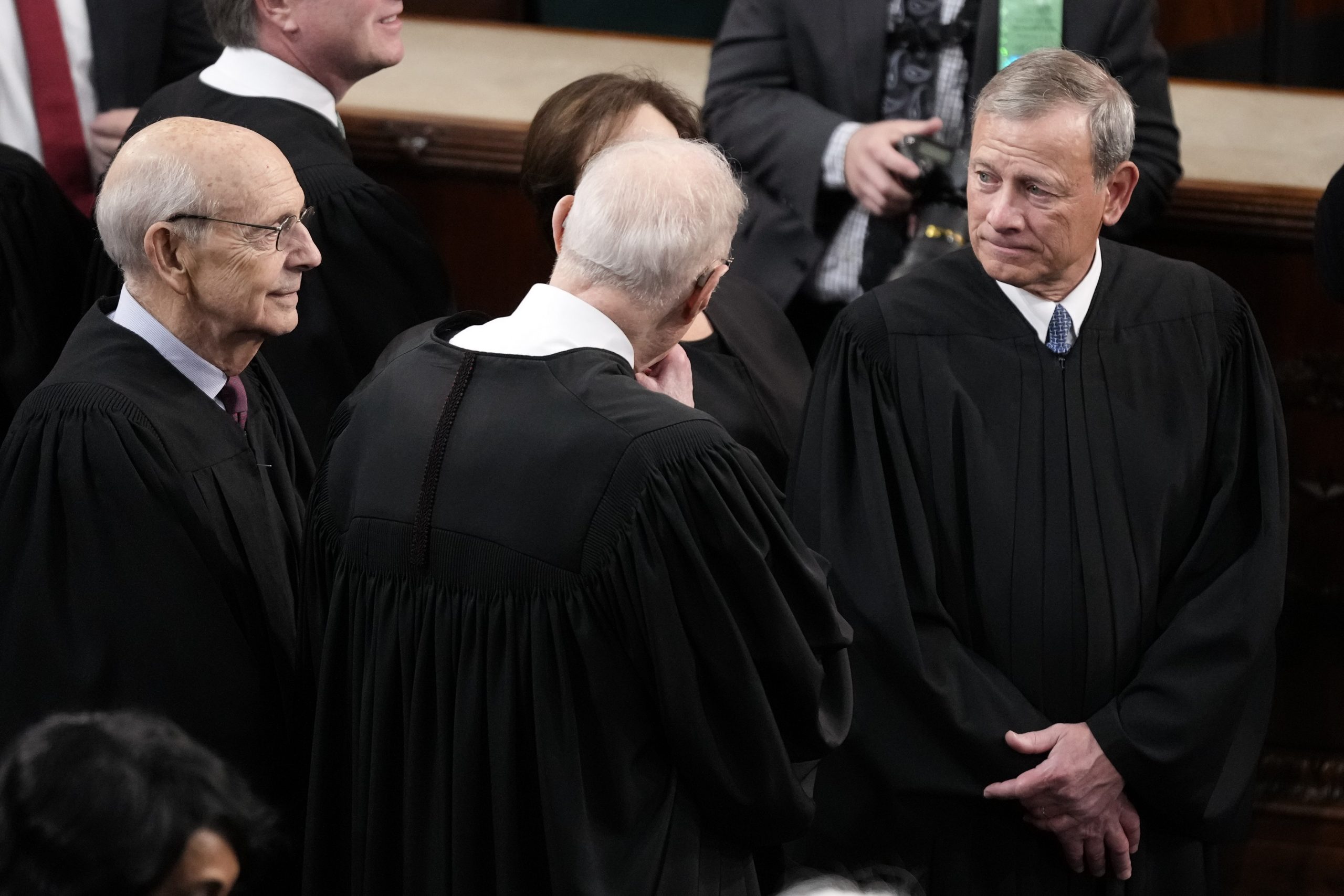Democrats in the Senate are ratcheting up new legislation to promote stricter ethics guidelines for the Supreme Court amid revelations that the justices have tried for years to compromise on a new code of conduct, only to fail on unanimity.
On the same day the Washington Post reported the justices had been trying without success to agree on a code of conduct for at least four years, citing sources familiar with the matter, Democrats in the Senate introduced two pieces of legislation that aim to heavily clamp down on the justices’ ability to exercise their own discretion on the Code of Conduct for United States Judges, which was first introduced in 1973 and is consulted by the nine justices on the bench.
The first bill is titled the Supreme Court Ethics Act, legislation introduced by Sen. Chris Murphy (D-CT) with the backing of 25 Democratic senators. Companion legislation in the House is backed by Rep. Hank Johnson (D-GA). The main provision of Murphy’s bill would establish a statutory ethics officer and a process for filing complaints against the justices for violating ethics rules.
SUPREME COURT DEADLOCKED ON ENACTING ETHICS CODE OF CONDUCT

Another bill known as the Supreme Court Ethics, Recusal and Transparency Act was introduced by Sen. Sheldon Whitehouse (D-RI) Thursday and is also backed by Johnson. Its primary provision includes a complaint process and creates a panel for reviewing justices’ indiscretions.
Questions on ethics standards have been raised numerous times in recent years about various justices. Such inquiries arose last year as text messages revealed Justice Clarence Thomas’s spouse, Ginni Thomas, supported former President Donald Trump’s efforts to overturn the election. Likewise, ethics concerns came up when liberal Justice Ruth Bader Ginsburg raised vocal criticism of Trump during the 2016 campaign.
Most recently, Supreme Court ethics faced a new round of scrutiny after a former colleague of Chief Justice John Roberts‘s spouse alleged a potential conflict of interest due to her paid work of recruiting lawyers at top firms.
Judicial ethics expert Russell Wheeler of the Brookings Institution wrote an op-ed in 2011 titled “Regulating Supreme Court Justices’ Ethics—’Cures Worse Than the Disease?'” In his report, he underscored that the Judicial Conference’s rules “explicitly reject the position that a Code [of Conduct] violation is, per se, a ground for finding misconduct.”
When asked whether his views are different since writing his 2011 op-ed, Wheeler told the Washington Examiner on Friday his only change of perspective is that “the court would do itself a favor by issuing a code of conduct … not because I think [it] would make an awful lot of difference, but it would show the public that the court is aware of its ethical obligations.”
Still, Wheeler was lukewarm on the proposals offered by Democrats, saying, “It would be like the code is now, an advisory code, you know. A lot of it is full of generalities. That’s one of the problems of this bill here,” adding that at the very least, “there’s some symbolic value to it.”
In his 2011 end-of-year report on the judiciary, Roberts said it was a “misconception” that the justices did not consult the code of conduct and expressed disagreement on public perceptions that the high court maintained a lower ethics standard than district or appeals courts.
Likewise, legislation enacted through Congress might raise constitutional questions because lawmakers would essentially be involving themselves in the internal affairs of a different branch of government. The Supreme Court already adheres to recusal and financial disclosure rules that were adopted by Congress, but Roberts also posited in his report that the court has “never addressed whether Congress may impose those requirements.”
Judicial reform was once a more bipartisan topic among Republicans and Democrats but has grown increasingly imbalanced since Trump cemented his judicial legacy with three appointees to the bench, creating a 6-3 conservative supermajority, with Roberts’s moderate jurisprudence outnumbered by right-leaning justices.
When several Democrats last year called on Clarence Thomas to recuse himself from legal cases involving Trump because the justice’s spouse supported 2020 election fraud claims, GOP Senate Leader Mitch McConnell (KY) referred to Democrats’ complaints as “part of a yearslong quest to delegitimize the court.”
Conservative judicial activist Carrie Severino, president of the Judicial Crisis Network, said calls for stricter ethics codes on high court justices were being raised by Democrats for “bogus reasons.”
“First, the Left tried to popularize court packing, and now, they are trying to force conservative justices to recuse for bogus reasons. They will stop at nothing to take over the court,” Severino told the Washington Examiner.
As it stands, district court and appeals court judges follow the judicial ethics code in a way that requires them to “avoid impropriety and the appearance of impropriety in all activities.” If a judge is found in violation of the code, they can be investigated and reprimanded through a separate complaint process.
Gabe Roth, founder of Fix the Court, an advocacy group that seeks reforms in the federal judiciary, told the Washington Examiner he backed the bills because “there’s currently no way to file a formal complaint against a Supreme Court justice for violating ethics rules.”
“These bills would fix that oversight by creating accountability processes — and, in focusing on the advisory nature of the process, do so in a way that can function within our constitutional order,” Roth added.
Still, Wheeler was frank in his belief that while a specific code of conduct for the Supreme Court could provide breathing room and get judicial watchdogs “off their back,” he contended that Republicans likely won’t support either measure.
CLICK HERE TO READ MORE FROM THE WASHINGTON EXAMINER
“I think it’s moot because I don’t think it’s gonna pass. It’s just something we’re going to be living with for a while,” Wheeler said.
The Washington Examiner contacted the Supreme Court for response.

